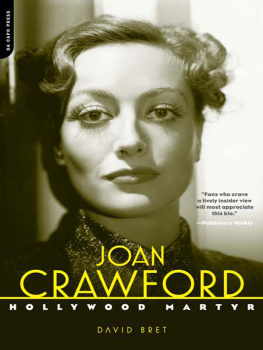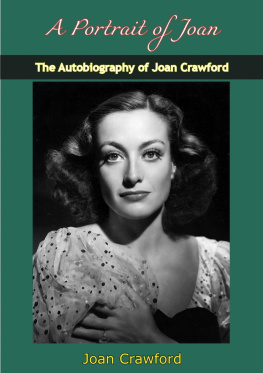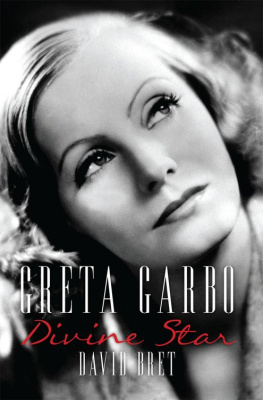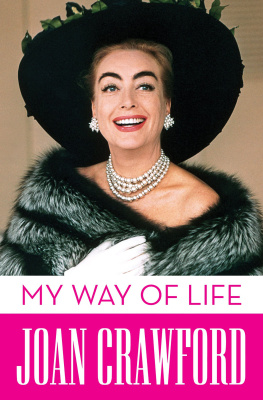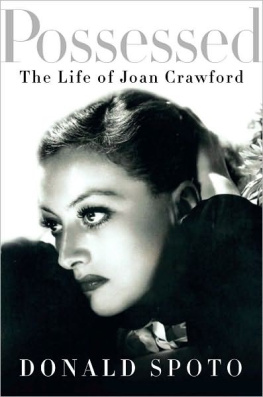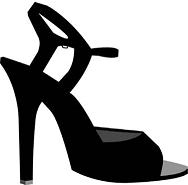
Introduction
She was one of four genuinely great movie actresses of the twentieth century the others were Garbo, Hepburn and Bette Davis. Like them she was totally uncompromising, on and off the screen. Hers was the classic Hollywood rags-to-riches story: the tramp who became a lady; the girl from the wrong side of the tracks who unashamedly slept her way to the top.
Joan Crawford was not the first to use sex as a stepping stone towards immortality; nor will she be the last. Yet despite being a product of the now-defunct all-powerful studio system, she kept her dignity intact. The fans, and to a certain extent the media, never found out what was happening behind that big red curtain of megastardom. Each time Crawford stepped into the public arena, she looked every inch the legend she became in her own lifetime, and behaved accordingly something that does not happen today, with the emphasis so often placed on grungy appearances and tabloid-exploited moral turpitude.
Aspects of Joan Crawfords extraordinary, complex psyche were incorporated into many of her films, within which the actress and character became as one, but such was the naivety of America during the Depression, few made the connection. The same may be said for Crawford, gay icon par excellence. Few people realised, at the time these events were unfolding, of her fondness for gay and bisexual men on account of their fear of being exposed by the media. Three of her husbands slotted into this category, as did many of her lovers, including Clark Gable.
After her death in 1977, Joan Crawfords reputation was sullied in one fell or foul swoop with the publication of Mommie Dearest, her adopted daughter Christinas frequently scathing account of what it had allegedly been like to be a Hollywood child raised by a megalomaniac. How many, if any, of her mothers reported acts of cruelty are authentic is not known, but with any lack of real evidence they are thought to have been exaggerated. Walking in the shadow of an international monument proven to be more talented, beautiful and charismatic than oneself will ever be can never be easy. Being taken in by such a person and offered a lifestyle beyond ones wildest dreams, then to maliciously attack that person from beyond the grave, can only be interpreted as unforgivable. As with some of her contemporaries, however instinctively one thinks of Marlene Dietrich and Bette Davis, similarly maligned by bitter, ungrateful offspring the damage inflicted by Christina has not proved long-lasting, proving the fact that true legends survive every adversity, in death as they did in life. The fact that Joan was accused of beating her children with wire coat-hangers even extended her fan base during the early Eighties, with some American gay magazines giving away such items as part of their subscription packages!
It was another renowned fag-hag, Tallulah Bankhead, who with the greatest respect awarded Joan Crawford her so-called under-the-counter nickname, The Lady With the Fuck-Me Shoes owing to the call-girl ankle-straps she wore in her early films. Joan loved the moniker, and more than once found herself bleeped in television and radio interviews for repeating it.
This is her remarkable story.
CHAPTER ONE

Billie Cassin and the Casting Couch
Bette Davis used to tell everyone that Joan Crawford only got into moviesby way of the casting couch until Joan hit her back with, Well, my dear,it sure beat the cold, hard floor!
Marlene Dietrich
She was born Lucille Fay LeSueur, most likely on 23 March 1904 (though she always maintained it was 1908, when birth certificates became state mandatory, and also the year of arch-rival Bette Daviss birth) in San Antonio, Texas and not in humble circumstances, as has been often stated. Although her French-Canadian father, Thomas, deserted his family shortly after her birth, her Irish-Scandinavian mother, Anna Bell (Johnson) coped rather well looking after her two children Daisy, her first-born, had died in infancy and Hal Hayes was born 1902 until a certain Henry Billy Cassin came along.
Cassin was a jack of all trades. Where there was a dollar to be made he would be there, whether bail-bonding or acting as a disreputable notary public. His chief source of income came from two small theatres in Lawton, Oklahoma: the grandly named Ramsey Opera House, where the ballerina Anna Pavlova and the notorious chanteuse Eva Tanguay had once appeared, and Cassins Air Drome, an open-air establishment that engaged the more regularly performing (and cheaper) vaudeville acts and put on minstrel shows.
Lucille loathed her first name, and by 1912 was calling herself Billie the female equivalent of her stepfathers nickname. She was also very much the tomboy, preferring the company of the neighbourhoods roughneck boys to the more genteel girls, always getting into scrapes, and leaning more on Billy Cassin than her feisty, wayward mother usually because he allowed her to have her own way and, against Annas wishes, not only turned a blind eye to her truancy but encouraged her to mingle with the rough-and-ready grease-paint crowd. By the age of eight, Billie knew next to nothing about schooling, but she was already a fairly accomplished hoofer half-ballet, half-tap.
During the summer of 1913, this relatively idyllic world came crashing about Billies ears when Cassin was accused of misappropriating bail money and forced to flee town, with his family, and seek refuge with the Johnsons, Annas parents in Phoenix, Arizona. They stayed here but a few weeks before relocating to Kansas City, Missouri, where Cassin claimed he had connections quite likely this was untrue. While waiting for the money to come through from the sale of the small bungalow he had owned in Lawton, Cassin rented them a single room at the New Midland Hotel, a hostel for down-and-outs in the citys red-light district. When the Lawton property was eventually sold, it brought in less than Cassin had been expecting, and certainly not enough to buy the house Anna had set her heart on. Then he learned that the owners of the New Midland were moving on and, hoping this would provide him with enough revenue to set up another theatrical venture, Cassin took over the lease.

